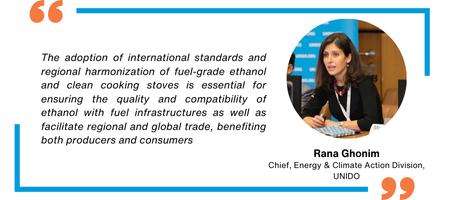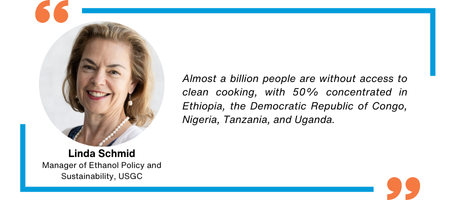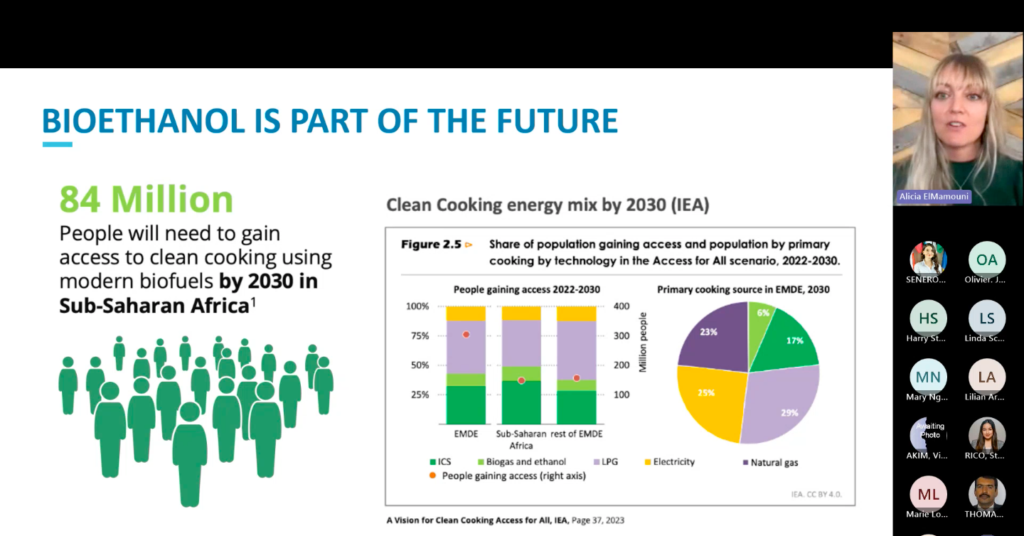Events
Back to Events page →Insights from the CECC Webinar on Ethanol Policy and Sustainability on 17 September 2024
The recent webinar, “Ethanol Policy and Sustainability”, co-hosted by UNIDO, CECC and the U.S. Grains Council (USGC), brought together key sectoral experts to discuss ethanol’s potential in driving energy transition globally and clean and sustainable energy solutions, particularly in Africa. The event focused on the need for adoption of international standards, regional harmonization, and robust policy frameworks to support the integration of ethanol in the fuel infrastructure for clean cooking and transport.

In her keynote address, Linda Schmidt, Manager of Ethanol Policy and Sustainability at USCGC, presented a compelling case for bioethanol as a clean cooking fuel, particularly in Africa. Linda outlined the environmental benefits of bioethanol, including reducing greenhouse gas emissions and curbing air and groundwater pollution.

The webinar featured success stories national and regional level standards development and adoption from Kenya, Mozambique as well as ECOWAS region.
Mary Ngotho, Senior Standard Officer at Kenya Bureau of Standards (KEBS), shared an inspiring example of Koko networks in Kenya, a pioneer in disseminating bioethanol cooking fuel and stoves in scale. “Koko Networks servicing over 1.25 million households daily through 3,000 agents in Kenya,” This was possible because of conducive policies and standards established by the Kenyan Government.
Ngotho also touched upon the challenges facing the ethanol industry, such as the need for better enforcement of standards to prevent adulteration of ethanol products. However, Ngotho expressed optimism about the industry’s growth, noting that it supports multiple Sustainable Development Goals (SDGs), including good health, access to clean energy, and economic growth.
Harry Stokes, the CEO of Project Gaia, echoed these sentiments, stating, “Both clean cooking and fuel blending are enormous potential markets in Africa, and they are highly compatible with each other.” He noted that robust policies, regulations, and standards are essential to unlocking this potential, with Kenya serving as a model for ethanol adoption in both fuel blending and clean cooking sectors.
Stokes highlighted UNIDO’s role in facilitating the development and adoption of ethanol standards, particularly through its work in ECOWAS region u through ECREEE, the entity that leads policy and standards development for ECOWAS.
Alicia ElMamouni, Executive Director of Pivot,provided an in-depth discussion on the role of international standards in ensuring consumer safety and facilitating market growth. “Standards are really an important part of our daily lives, even though we often don’t notice them,” she remarked. ElMamouni highlighted how standards, such as those developed by ASTM and ISO, are crucial for bioethanol cooking fuel, ensuring quality control and improving trade opportunities both regionally and internationally.

ElMamouni shared example of their work in Mozambique, which has set a template for bioethanol standards and adoption that can be replicated across sub-Saharan Africa. She explained the collaborative process of engaging local stakeholders to tailor standards that meet each country’s specific needs. Such an approach not only helps develop biofuels policies but also opens up market opportunities for the private sector and promotes green job creation.
Jossy Thomas, on behalf of the CECC Secretariat, summarized the key challenges and opportunities for massive adoption of fuel grade ethanol in Africa. Limited local and regional ethanol production and trade as well as reluctance of Governments to lower trade barriers, make it difficult for private sector to commiting ethanol production. Thomas emphasized that many sugar industries across Africa are missing out on opportunities to produce ethanol which is a valuable byproduct. The sugar industry can produce not only sugar but also fuels like electricity, ethanol, and biogas, contributing to energy supply and reducing energy poverty,
Thomas concluded the webinar by highlighting the critical role of standards and policies in accelerating the growth of the bioethanol industry and value chains in developing countries. He thanked all participants and expressed optimism that the insights gained from the webinar would spur further action accelerating domestic production in bioethanol.”
The event successfully demonstrated that with the right policies, standards, and market support, ethanol could play a transformative role in addressing both energy and environmental challenges across Africa and beyond.
You can find the recording of the webinar through this link.
